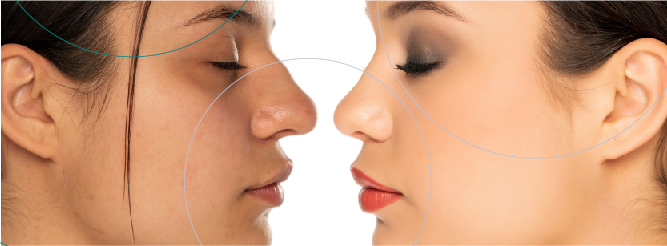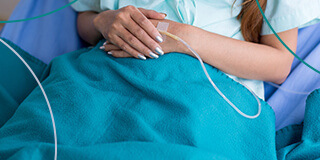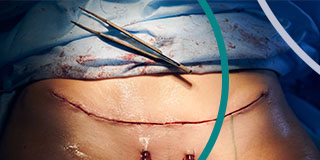
One of the most common surgeries to date is the liposuction, whether it’s for reconstructive or cosmetic reasons, many patients are interested in this type of surgery because of what the procedure entails. It can be performed alone or as a complementary surgery to the abdominoplasty, also known as the tummy tuck, to give the stomach a smoother, more toned appearance. If you’ve recently had a tummy tuck and want more information about the liposuction, we invite you to read the following article.
If you want to know if you’re a candidate for the liposuction, your doctor will go over your medical history and carry out an in-person examination to evaluate if it’s the right procedure for you. Once it’s decided, they will give you a set of preoperative instructions to make sure that your body and mind are prepared for the surgery. Keep in mind that these instructions will be strict and that it’s important that you follow them to avoid any kind of risk during the liposuction.
Once you’re out of surgery, your aftercare process will begin and you will be given new indications so that your body recovers appropriately. At LIMARP®, Dr. Liza María Pompa González and our team of surgeons are by your side in every step of the way, making sure that your aftercare process goes smoothly. They will also answer any question you may have pertaining the postoperative process and will likely refer you to a dietitian so that they can create a nutrition plan to help you keep the weight off.
This article will focus on the aftercare process following a liposuction, as well as what the procedure entails and some of the possible risks that may occur if you don’t follow the instructions your doctor gave you. Keep in mind that liposuction is not a fool-proof solution and to be consistent with your weight loss journey, you should incorporate a healthy diet and physical activity to your daily routine.
What’s Liposuction?
A liposuction is a procedure commonly used in plastic surgery to remove fat and while it’s considered to be generally safe, not all surgeries are equal because they depend on the amount of fat that’s being removed and the anesthesia (general, regional, or local) that will be applied. Surgeons use a cannula and negative pressure to suck out the fat and the techniques may vary according to how the cannula works or if the removed fat will be used as a filler for other parts of the body.
Liposuction can be performed on many areas of the body, but is most commonly used to modify the following body parts
- Flanks
- Abdomen
- Upper arms
- Buttocks
- Hips
- Inner thighs
Although liposuction is one of the most popular cosmetic surgeries, there are studies that conclude that it’s not an effective remedy for long term weight loss and it doesn’t affect obesity-related conditions. After recovery, the body’s overall fat returns as it was before the surgical procedure, regardless of diet and exercise regime, and the increase is most notably on the abdominal area. The patient may also experience excess visceral fat around the internal organs which can cause other diseases such as diabetes.
The downsides of liposuction to treat weight loss are well known, but this procedure is still used for aesthetic improvements and body contouring. It’s important that you speak to your doctor about your expectations and what can be done if you regain the fat that was lost after liposuction.
For more information about liposuction, we invite you to read the following article on our website or to schedule an in-person appointment with one of our doctors.
Aftercare Process
As is the case with most surgeries, there are several aftercare steps you must take following a liposuction to make sure that your body heals properly. The amount of time you remain at the hospital following your liposuction will depend on the quantity of fat that was removed from your body, but patients usually get to go home a few hours after the surgery. Once you’re discharged, your doctor will provide a set of aftercare instructions that span over several months.
Each patient recovers differently and factors such as age and medical history can influence how long you take to heal. Next, we’ll present some of the aftercare instructions that your surgeon may suggest, as well as an estimated recovery timeline.
- First of all, it’s important that someone picks you up following your surgery. Due to the anesthesia and pain medication, you won’t be in any condition to drive home yourself.
- Soreness, bruising, and swelling are expected within the first few days of your aftercare process. To ease the discomfort brought by these side effects, your doctor will prescribe medication and instruct you to wear a compression garment, which you should wear until your doctor says otherwise because it reduces swelling and can help with soreness. Because the compression garment limits movement, it’s important that you reduce any physician activity that puts your body under too much stress.
- You should be able to return to work two weeks following the liposuction, but be aware of how your body responds to you going back to your old lifestyle. Soreness should be decreasing around this time and any abnormal spikes in pain are signals that your body is not ready for more demanding activities.
- While the aftercare recovery can’t be put on fast forward, there are several steps you can take to make yourself more comfortable, such as eating healthy, staying hydrated, getting enough rest time, going on short walks to prevent blood clots, and asking for help to avoid putting your body through any strenuous activities.
- A month after your surgery, it’s likely that you won’t be experiencing any more soreness or pain, and will only be dealing with swelling. You should start seeing results around this period of time and they will only continue to improve once the swelling subsides, which could take a couple of months more. Around this time, your doctor will also tell you that you can resume physical activity, like light exercises or stretching.
- The last step in the aftercare process is removing the compression garment or bands that were placed on your body to achieve more defined contouring. Your doctor will review your progress and decide when you can stop wearing them.
As we’ve mentioned before, each patient’s case, as well as their aftercare process, can be different and the timeline we presented may vary according to how well you followed your doctor’s instructions or how your body responded to the liposuction. Postoperative complications are not common, but they may arise and you should be aware of the signs in order to contact your doctor if you start experiencing them.
Some of the complications include:
- Chest or leg pain
- Shortness of breath
- Fever
- Severe swelling
These complications are treatable and once you’re cleared by your doctor, you’ll be able to enjoy the results of your liposuction. We recommend, as part of your aftercare process, that you add physical activity and start following a healthy diet to maintain your form.
Contact Us to Learn More
If you want to know if you’re an eligible candidate for liposuction and need more information about the surgery, schedule an appointment with one of our doctors. We can help determine the right treatment for you. Contact us online anytime or give us a call at (619) 373-0229.


